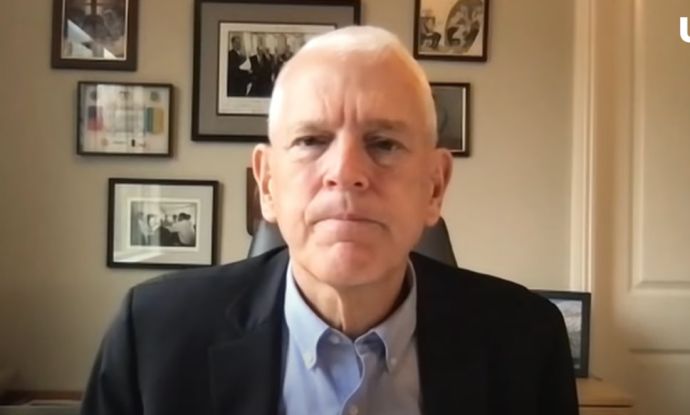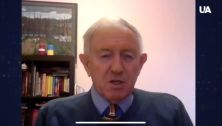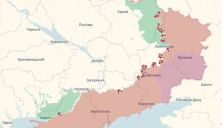In an interview with UATV, English, former U.S. Ambassador to Ukraine Steven Pifer, shared his view on why sanctions FAILED and how Ukraine should approach future peace talks in his opinion. Hear it for yourself.
— Well, peace initiatives of Western leaders—we’ve heard of many of them. Do you personally believe, sir, that any sort of—let’s put it this way—reliable agreement with Putin is even possible?
— Well, let me start by saying I’m not sure that it’s up to the West to try to force a negotiation or force an end to the war. I mean, to me, that has to be a Ukrainian decision, both about entering into negotiations, but also on the terms of a settlement.
And I can understand the reluctance in Kyiv, when thus far, I simply see no effort by Moscow to offer a good faith negotiating approach.
— Absolutely. I’m in Kyiv now, and absolutely. But with all these talks of escalation—honestly, sliding into my other question—escalation management, whatever that means, sounds like complete rubbish to me. Do you think I’m wrong, and do the United States and the West collectively have real leverage over Russia, other than direct military support for Ukraine?
— I think that the West has leverage both in terms of its ability to support Ukraine, which I think the West should do and should continue to do, and also in terms of tightening sanctions on Russia.
I think the sanctions, while they have not delivered the impact that I had hoped for two years ago, have constrained Russia. The important thing now is to tighten up those sanctions to make it harder, particularly for the Russian defense industry, to do its part to keep Russia in the war.
But when you look at this whole question of escalation, here’s my concern. I think, really, in Washington, going back almost two and a half years now, Washington said it has two goals for the war: one is to help Ukraine win, and the other is to avoid a direct conflict between NATO and Russia.
I think those are the right two goals. But where I would be critical of the administration is when they’ve combined the goals. They have been too cautious. They’ve been more nervous about Russian escalation than I think the situation requires.
We could have done more, and we can do more for Ukraine without the kind of fears that I think have slowed decisions by Washington and other Western countries to help Ukraine.
— Thank you very much for your answer. I would partly disagree with you, because if Washington really wanted to win the war together with Ukraine and for Ukraine—and for international law and order—it would do so. Washington would definitely do so.
But maybe the plan was to bleed Russia—maybe I’m just speculating.
— Yeah, I don’t think it was that. I think what we’ve seen is that Washington has been overly cautious, again, I believe, because they have attached too much concern to the fear of Russian escalation, when I think, in fact, the possibility of Russian escalation is really quite limited.
The last thing that Russia wants right now is a war with NATO. But I believe there’s been too much caution in Washington and decisions. At the end of the day, Washington usually takes the right decisions—including finally letting Ukraine use ATACMS missiles to hit military targets in Russia.
The problem has been that those decisions take too long. Decisions that could have been made in three or four weeks take six or seven months, and I think that’s had, unfortunately, a negative impact on Ukraine’s ability to defend itself.
— What costs the collective West money costs blood in Ukraine. That’s as simple as that.
— Exactly. And that includes what happened with the American Congress, where Speaker Mike Johnson, for five months, delayed the House of Representatives from voting on additional assistance for Ukraine. That had a real cost for Ukrainians. It was unfortunate, it was unwise, and it was a mistake by the American Congress.
— Well, the escalation is here now, whatever that means—escalation, I hate the term—but it is here. The involvement of the DPRK [North Korea] and other policies of the “Axis of Evil” in the war against Ukraine and international law—just as I said. What should the free world’s response be, do you think?
— My first comment would be that the fact Russia is recruiting soldiers from North Korea is a sign of a certain desperation on Russia’s part.
I think that suggests that Vladimir Putin is, in fact, becoming more concerned about the costs being imposed on Russian soldiers. The British Ministry of Defense now estimates that since February 2022, the Russian military has suffered 700,000 soldiers killed or injured. So, I think there’s a certain amount of desperation there.
— What could have been done three years ago? Shall we thank Trump’s possible military deprivation for that? Or maybe that was exactly his plan after all?
— I’m not sure what Mr. Trump’s plan is. Let me make a couple of comments. First of all, the president-elect is unpredictable.
Second, I’ve never been to Mar-a-Lago, so I have no particular insight into what he’s thinking right now. But, quite frankly, when I think about European security questions—how the United States continues to support Ukraine, how the U.S. deals with Russia, how the U.S. deals with NATO—Mr. Trump’s presidency worries me.
If you look at what he said in the past, I’ve seen nothing in the last couple of years to suggest that he supports continued American assistance for Ukraine. So, I worry—and I hope he proves me wrong—but I worry that in January 2025, there could be an end to American assistance.
I think that would be bad for Ukraine, bad for Europe, and ultimately bad for American national security. That worries me.
Likewise, his comments about NATO. In February of this year, he basically said, “If certain allies don’t pay the amount of money they’re supposed to pay, then Russia can do whatever it wants.” That’s not a signal to Vladimir Putin that the United States is committed to NATO’s defense.
I want Mr. Putin to believe that any threat to NATO would bring an American military response, because that’s how deterrence works. I worry that Mr. Trump does not understand that.
I also worry that when he thinks about NATO and alliances, it’s all about money. In Afghanistan, we lost 2,400 American soldiers over 20 years, but 1,000 NATO troops died there as well. They were only there because of alliances. I’m not sure Mr. Trump understands that.
So, I hope he proves me wrong, but I’m very concerned about what a Trump administration could mean for American policy—not just towards Ukraine, but towards NATO and Russia.
— Totally understand your concern, sir. But in a sense, Mr. Trump already proved you wrong, because he was the first to give Ukraine lethal weapons, like Javelins. I’m also concerned, but Trump talking and Trump walking are like two different personalities. He is unpredictable, probably. But don’t you think Democrats actually needed some decisiveness? Because what Democrats showed the world was like yielding ground to any opposing force—including Trump.
— Well, again, I have been critical of certain aspects of Biden administration policy. But the administration has gone to Congress and secured tens of billions of dollars to support Ukraine at a level that was perhaps not predictable back in February 2022.
I don’t know if that level of support will continue under Mr. Trump. Again, perhaps the prospect of an American aid cutoff causing Ukraine to lose will have some effect on his thinking.
As I said, I hope he proves me wrong, but I’m worried about what a Trump administration means for American policy towards Europe. That will be bad for Ukraine, bad for Europe, and ultimately lead to a greater Russian threat to both Europe and the United States.
Read also: It’s a Chance One for a Million: Rebels Advance in Syria. Interview with Martin Krzyzanowski










